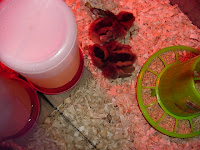This is my diary of delving into the backyard chicken farm scene. Luckily, I live outside of all city limits and live in "unincorporated" territory. On the not so great side is the fact that we have all sorts of wild creatures in addition to the typical stray dog and cat. We have fox, coyotes, deer, rabbits, gophers, raccoons, opossums, weasels, beavers, nutria, heron, owls and hawks (that I know of) that cross through our back yard. There have been instances of cougars, bobcats and black bears, but that is rare. But, I need to be more aware of the predators than the city folks do.
When I mention we, I mean my son, my husband and myself. We have all tried to contribute information that we read or have other knowledge about before making decisions as to what we collectively decide to do.
Prior to picking up the chicks, we purchased a small one-quart chick sized waterer, a small feeder, large bale of aspen shavings (we use that type already for the guinea pigs),
some medicated chick food (25 lbs), some electrolytes with vitamins to
add to the water, baby chick sized grit, a red 250-watt heat light and
clamp on heat lamp with shield. Cut a small piece of two x four wood to
put the mini waterer on to keep it up out of the shavings and less
likely for the chicks to trample through the trough. I had an unused
30-gallon aquarium, so we filled the aquarium with a thin layer of
shavings, put the feeder and water (with electrolytes) in the make-shift brooder, and rigged
up a light stand for the heat lamp. For now, with the small size of the chicks, we can get by with the three square foot floor space. The total cost for the items (not
counting the aquarium) was about $50.00. I also had a thermometer that I placed in the bottom of the aquarium to help gauge the temperature. We wanted to ensure that the temp was between 90F and 95F.
After a lot of research on breeds of chickens, we decided on trying the Russian Orloffs. One of the local farm stores gets this breed of chicks in on a regular basis, so we drove into town to pick up four one-week old baby chicks and brought them home in a little box. We were going to get three, but on the spur of the moment, my son and I decided we better get four since we had read that it is not uncommon to lose a small percentage of them to a variety of illnesses and/or deformities.
On the way home, with each bump in the road, the babies would loudly peep to express their dissatisfaction with my choice of routes or my driving skills.
 |
| One week Russian Orloff Chicks |
We got them home, and safely deposited the four little chipmunk colored peeps into the warmed aquarium. I introduced each chick to the waterer by gently dipping their beaks into the water and then setting them down next to the water. In no time, the little chicks, one by one, were drinking water, eating food and then quickly running back to the warmth of the light and huddling with the other three.
I put a screen cover over the aquarium with a weight to keep our pooch and fraulein feline out of the make-shift brooder. Throughout the day and into the next, we adjusted the height of the lamp to strive for the ideal temp. Of course, we would encounter a heat wave on the first days, making it more difficult to keep the correct 90F temp.
 |
| Hi-tailing it back to safety! |
As the chicks settled in, we started holding them on our laps and caressing them to get them accustomed to us holding them. I had a packet of small white towels used for washing the car. The towels are not all soft and fuzzy, but they are great as poop catchers while the chicks are being held, plus the chicks seem to like walking on them and pecking at them, I think because they are rough. As soon as we were done holding the chicks, we would wash our hands because, as I mentioned earlier, there is always the chance the one or more of the chicks could have an illness, like Salmonella, and so we all are making a concerted effort to avoid accidentally contracting something that we would later dread having.
